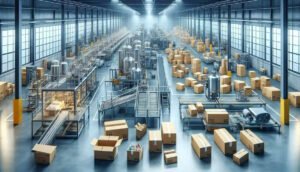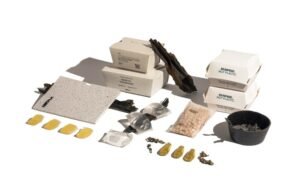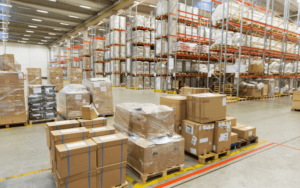
The Sustainability-Focused Startup Disrupting the Packaging Industry
Introduction
The packaging industry has long been a major contributor to environmental degradation. With millions of tons of plastic waste ending up in landfills and oceans annually, it's clear that traditional packaging methods are unsustainable. Consumers and regulators are increasingly calling for solutions that reduce waste and minimize the carbon footprint of packaging materials. In response, innovative startups are stepping up to disrupt the packaging industry with sustainability at the core of their mission.
These sustainability-focused startups are driving change by developing eco-friendly alternatives to conventional packaging. They’re offering solutions that are not only better for the planet but also cost-effective and scalable. This is the future of packaging—one that minimizes environmental harm while meeting the needs of businesses and consumers alike.
The Packaging Industry’s Sustainability Problem
Environmental Impact of Traditional Packaging
The packaging industry relies heavily on non-recyclable materials, such as single-use plastics, which take hundreds of years to decompose. In 2018 alone, an estimated 14.5 million metric tons of plastic packaging were produced globally, much of which ended up as pollution. Traditional packaging also contributes significantly to carbon emissions, from raw material extraction to manufacturing and transportation.
Furthermore, the industry’s reliance on fossil fuels for producing plastic exacerbates the environmental impact. This dependency has made it difficult for companies to transition toward greener practices, leaving a gap that sustainability-focused startups are now beginning to fill.
Growing Consumer and Regulatory Pressure
Consumers are becoming more environmentally conscious, with 74% of people willing to pay more for sustainable packaging. This shift in consumer behavior has pushed companies to adopt greener alternatives to avoid reputational damage. Governments around the world are also enacting stricter regulations on packaging waste. For example, the European Union has introduced a Plastic Strategy, aiming to make all plastic packaging recyclable by 2030.

How Sustainability-Focused Startups Are Disrupting the Packaging Industry
The Role of Startups in Driving Innovation
Startups are often more agile than larger corporations, allowing them to experiment with new materials and technologies quickly. They’re at the forefront of the packaging revolution, offering innovations like biodegradable packaging, plant-based plastics, and reusable systems. By embracing a sustainability-first approach, these startups are disrupting the status quo and setting new industry standards.
Case Study: A Sustainability-Focused Packaging Startup
One leading example is Notpla, a UK-based startup that produces biodegradable packaging made from seaweed and other natural materials. Their innovative solutions are not only compostable but break down in weeks, leaving no trace behind. In addition to reducing plastic waste, Notpla is also working on edible packaging, which could potentially eliminate waste entirely in certain industries, such as food and beverage.

Another noteworthy startup is Loop, which has pioneered reusable packaging systems for consumer goods. Loop partners with major brands like Nestlé and Unilever to offer products in durable, reusable containers. Once used, customers return the containers for cleaning and refilling, creating a closed-loop system that drastically cuts down on waste.
Key Technologies and Innovations in Sustainable Packaging
Materials Innovation
Sustainability-focused startups are investing in research to develop innovative materials that are both biodegradable and compostable. For instance, mushroom-based packaging, which uses mycelium, has gained popularity for its ability to decompose quickly while offering durability. Plant-based plastics, such as polylactic acid (PLA), derived from renewable resources like corn, are also gaining traction as they can be composted in industrial facilities.
Another innovation is recycled materials. Startups like Borealis are creating circular economy models by repurposing waste materials into new packaging solutions. This not only reduces the demand for virgin plastic but also helps decrease overall carbon emissions.
Smart Packaging Solutions
Some startups are going beyond materials innovation by focusing on the design of packaging itself. By using minimalist designs and optimized shapes, companies are reducing the amount of raw material needed. Additionally, startups like Algramo are exploring smart packaging systems for retail, where consumers refill containers with products like detergents and groceries, cutting down on single-use plastics.

The Future of Sustainable Packaging: Scaling Innovation
Challenges Startups Face in Scaling Sustainable Packaging
While sustainability-focused startups are introducing groundbreaking solutions, they face significant challenges in scaling their innovations. One of the biggest hurdles is cost. Sustainable packaging materials often require advanced technologies, making them more expensive than traditional options. Startups also struggle with convincing consumers and businesses to switch to new systems, especially when there’s a learning curve involved.
Logistics can be another issue. Transitioning to reusable or compostable packaging systems requires infrastructure changes in the supply chain, from production to waste management. Despite these challenges, startups are finding creative ways to overcome them, especially through collaboration and partnerships.
Opportunities for Collaboration
To overcome scaling issues, many startups are forming partnerships with larger corporations and governments. By working together, they can expand the reach of their innovations and drive widespread adoption. Governments can also help by offering subsidies or incentives for companies that choose sustainable packaging solutions.
Moreover, investments in R&D can help reduce costs and improve the performance of eco-friendly materials. This is essential for making sustainable packaging a viable alternative to traditional materials in the long run.
Conclusion
Sustainability-focused startups are at the forefront of a much-needed revolution in the packaging industry. Through innovative materials, smart designs, and reusable systems, they’re creating solutions that reduce waste, cut carbon emissions, and meet consumer demands for greener products. However, scaling these innovations will require collaboration, investment, and regulatory support.
As consumers and businesses become more aware of the environmental impact of packaging, sustainable solutions will increasingly become the norm. The future of packaging lies in innovation, and these startups are leading the way toward a more sustainable, eco-friendly world.


Nhận xét
Đăng nhận xét